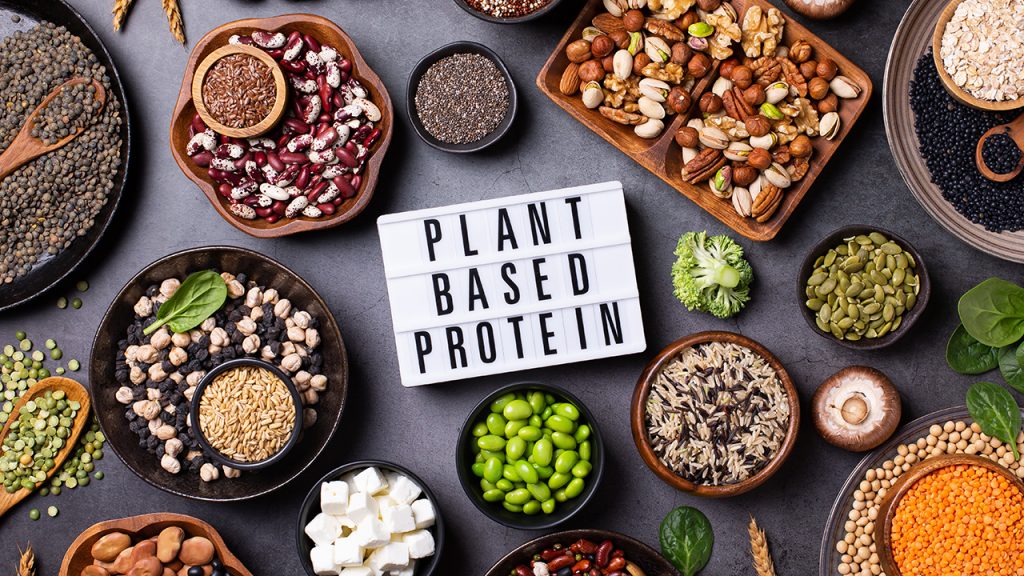
Chronic Kidney Disease (CKD) affects millions worldwide and significantly contributes to global mortality and morbidity. As a non-communicable disease, CKD is characterized by a gradual decline in kidney function, which, in advanced stages, can result in the dangerous accumulation of fluids, waste products, and electrolytes, leading to severe health complications. Thus, it is vital to focus on prevention or at least delay the progression of this disease.
Diet plays a crucial role in managing and preventing numerous non-communicable diseases, including CKD. Recent research highlights the benefits of prioritizing plant-based proteins over animal-based sources to help slow down the progression of CKD. This article explores the significance of a plant-based diet for CKD patients, detailing its advantages and drawbacks. Let’s delve into the details of how adjusting your diet can impact kidney health.
Sources of plant-based protein
When you think of protein, your mind might immediately go to animal sources such as chicken, pork, beef, or seafood. However, a wide variety of plant-based foods also offer substantial protein, providing excellent alternatives for meeting your nutritional needs. Here is a list of plant based proteins
- Lentils
- Chickpeas
- Peanuts
- Quinoa
- Almonds
- Chia Seeds
- Beans with rice
- Barley
- Oats
- Potatoes
- Green Peas
- Walnuts
- Pumpkin Seeds
The Benefits of Plant-Based Proteins
Protein is a crucial nutrient required for cell repair, muscle building, blood clotting, and hormone production. Typically associated with animal sources, plant-based proteins are increasingly recognized for their health benefits. Rich in fiber and low in saturated fats, these proteins offer a wealth of nutrients, including antioxidants. Consuming plant-based proteins can lead to improved heart and kidney health, weight management, and a lower risk of various cancers. Studies also indicates that diets high in plant-based proteins can improve blood pressure and cholesterol levels, thereby reducing the risk of kidney disease. These benefits make plant-based proteins an essential part of a balanced diet.
Why plant-based proteins?
Consuming animal proteins, particularly processed and red meats, has been linked to negative effects on vascular health and may contribute to the development of kidney diseases, many studies indicate. These proteins contain saturated fats, which are associated with inflammation. While occasional inflammation may not be harmful, persistent inflammation can escalate to serious health issues, including cardiovascular diseases, arthritis, and diabetes.
In contrast, plant-based proteins are less likely to cause inflammation due to their higher levels of antioxidants and lower saturated fat content according to research. This makes them a healthier choice in preventing chronic diseases. Moreover, foods rich in plant-based proteins typically contain more fibre than animal proteins. Fibre plays a crucial role in maintaining heart health, regulating blood sugar levels, and supporting the digestive system’s healthy functioning.
Plant-based diet: Pros and cons
Let’s look at the pros and cons of a plant-based diet:
Pros
- As stated above, processed and red meat contain more saturated fat and sodium that can lead to kidney damage. Consuming plant-based proteins over animal proteins can reduce the risk of developing kidney diseases
- Plant proteins contain Magnesium, Calcium and Vitamin C that help reduce the acid load in your meals and boost kidney function
- Plant-based proteins lead to a healthy gut since they are high in fibre
- Consuming plant-based proteins over animal ones helps lower the risk of high blood pressure and diabetes that contribute to kidney diseases
- Studies have also suggested that the intake of plant-based proteins can reduce the risk of death from kidney disease
Cons
- Getting your proteins only from plant sources can develop Vitamin B12 deficiency, leading to neurological issues, severe anaemia, paralysis, etc.
- Only a few plant sources are complete proteins, such as Quinoa and Soya Beans. Most vegan options are considered incomplete sources and do not contain all the vital amino acids your body needs
- Due to their lower absorption rates compared to animal-based proteins, increasing consumption becomes essential for meeting dietary requirements when opting for plant-based proteins
Kidneys are vital organs in the human body. They remove toxins from the blood, control blood pressure, produce hormones, etc. However, CKD patients experience a loss of kidney function over time, which can raise the risk of heart attack, stroke, anaemia, and other severe health complications. While changing your food habits is a personal choice, including more plant proteins over animal proteins in your diet can help manage kidney diseases effectively.
Although more research is needed, there is growing evidence showcasing the benefits of plant-based proteins for your kidney health. You can source proteins from several plant-based foods such as seeds, nuts, legumes, whole grains, etc. However, remembering the drawbacks of plant-based proteins is equally important while planning your diet. Ideally, you must eat a variety of plant proteins to ensure your body gets all vital amino acids.
We hope this article helps you. For further information or guidance, reach out to our certified experts by subscribing to GOQii’s Personalised Health Coaching here.
#BeTheForce
 The facts and myths about diabetes are plenty, especially on the kind of foods one should have or not have, whether one should exercise to
The facts and myths about diabetes are plenty, especially on the kind of foods one should have or not have, whether one should exercise to  Belly fat is not accumulated in a day or two. It takes several weeks and months of unhealthy eating and lifestyle to build it. When people finally decide to lose belly fat, the first thing they wonder is ‘Why am I not losing belly fat even after exercising so much and cutting down on junk food?’ There are several reasons for it.
Belly fat is not accumulated in a day or two. It takes several weeks and months of unhealthy eating and lifestyle to build it. When people finally decide to lose belly fat, the first thing they wonder is ‘Why am I not losing belly fat even after exercising so much and cutting down on junk food?’ There are several reasons for it. Gut health is a familiar concept, and it’s widely recognized that maintaining a healthy gut is beneficial for our overall well-being. Beyond just aiding digestion, a healthy gut supports our immune system, heart health, brain function, weight management, and numerous other facets of health.
Gut health is a familiar concept, and it’s widely recognized that maintaining a healthy gut is beneficial for our overall well-being. Beyond just aiding digestion, a healthy gut supports our immune system, heart health, brain function, weight management, and numerous other facets of health.



